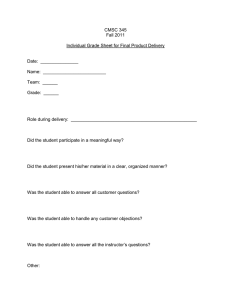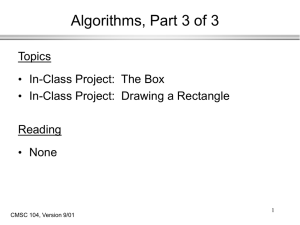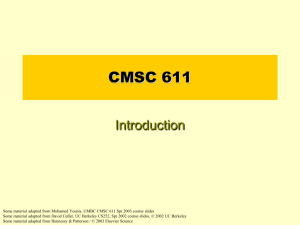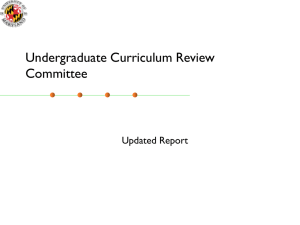Assembly Language and Computer Organization CMSC 313
advertisement
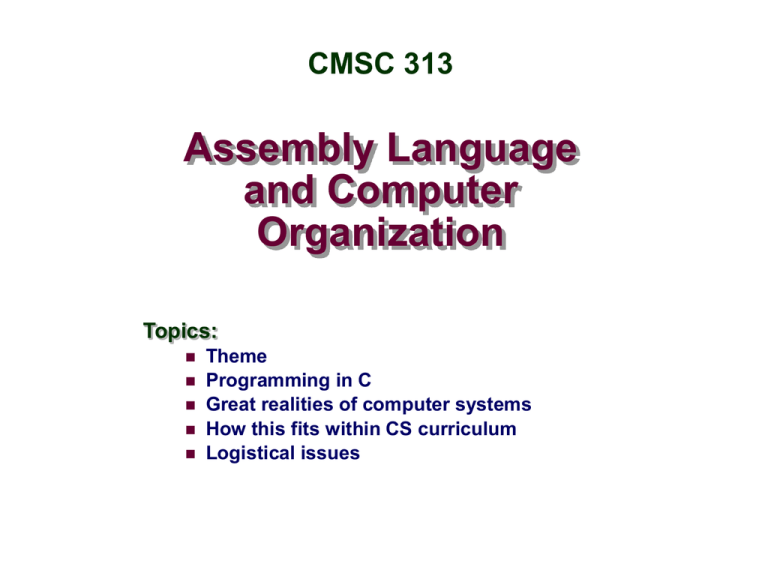
CMSC 313
Assembly Language
and Computer
Organization
Topics:
Theme
Programming in C
Great realities of computer systems
How this fits within CS curriculum
Logistical issues
Course Theme
Abstraction is good, but don’t forget reality!
Most CS courses emphasize abstraction
Abstract data types
Asymptotic analysis
These abstractions have limits
Especially in the presence of bugs
Need to understand underlying implementations
Useful outcomes
Become more effective programmers
Able to find and eliminate bugs efficiently
Able to tune program performance
Prepare for later “systems” classes in CS & ECE
Compilers, Operating Systems, Networks, Computer
–2–
Architecture, Embedded Systems
CMSC 313, F ‘10
Programming in C
We assume you have experience in Java or other
high-level language (e.g. C++) that uses the same
syntax
C is “closer” to the hardware than other languages
You are responsible for everything that happens
Array index validation
You must understand how the computer works to write
efficient, portable code
Pointers, dynamic memory allocation must be handled by
your code
Powerful, but dangerous
No garbage collector like Java
Functions are the focus, there are no objects
–3–
Encapsulation is difficult at best
CMSC 313, F ‘10
Memory Referencing Errors
C and C++ do not provide any memory protection
Out of bounds array references
Invalid pointer values
Abuses of malloc/free
Can lead to nasty bugs
Whether or not bug has any effect depends on system and
compiler
Action at a distance
Corrupted object logically unrelated to one being accessed
Effect of bug may be first observed long after it is generated
How can I deal with this?
–4–
Program in Java or ML
Understand what possible interactions may occur
Use or develop tools to detect referencing errors
CMSC 313, F ‘10
Great Reality #1
Ints are not Integers, Floats are not Reals
Examples
Is x2 ≥ 0?
Floats:
Yes!
Ints:
» 40000 * 40000 --> 1600000000
» 50000 * 50000 --> ??
Is (x + y) + z = x + (y + z)?
Unsigned & Signed Ints:
Yes!
Floats:
» (1e20 + -1e20) + 3.14 --> 3.14
» 1e20 + (-1e20 + 3.14) --> ??
–5–
CMSC 313, F ‘10
Computer Arithmetic
Does not generate random values
Arithmetic operations have important mathematical
properties
Cannot assume “usual” properties
Due to finiteness of representations
Integer operations satisfy “ring” properties
Commutativity, associativity, distributivity
Floating point operations satisfy “ordering” properties
Monotonicity, values of signs
Observation
–6–
Need to understand which abstractions apply in which
contexts
Important issues for compiler writers and serious application
programmers
CMSC 313, F ‘10
Great Reality #2
You’ve got to know assembly
Chances are, you’ll never write a program in assembly
Compilers are much better & more patient than you are
Understanding assembly key to machine-level
execution model
Behavior of programs in presence of bugs
High-level language model breaks down
Tuning program performance
Understanding sources of program inefficiency
Implementing system software
Compiler has machine code as target
Operating systems must manage process state
Creating / fighting malware
x86 assembly is the language of choice!
–7–
CMSC 313, F ‘10
Assembly Code Example
Time Stamp Counter
Special 64-bit register in Intel-compatible machines
Incremented every clock cycle
Read with rdtsc instruction
Application
Measure time required by procedure
In units of clock cycles
double t;
start_counter();
P();
t = get_counter();
printf("P required %f clock cycles\n", t);
–8–
CMSC 313, F ‘10
Code to Read Counter
Write small amount of assembly code using GCC’s asm
facility
Inserts assembly code into machine code generated by
compiler
static unsigned cyc_hi = 0;
static unsigned cyc_lo = 0;
/* Set *hi and *lo to the high and low order bits
of the cycle counter.
*/
void access_counter(unsigned *hi, unsigned *lo)
{
asm("rdtsc; movl %%edx,%0; movl %%eax,%1"
: "=r" (*hi), "=r" (*lo)
:
: "%edx", "%eax");
}
–9–
CMSC 313, F ‘10
Great Reality #3
Memory Matters:
Random Access Memory is an
un-physical abstraction
Memory is not unbounded
It must be allocated and managed
Many applications are memory dominated
Memory referencing bugs especially pernicious
Effects are distant in both time and space
Memory performance is not uniform
– 10 –
Cache and virtual memory effects can greatly affect program
performance
Adapting program to characteristics of memory system can
lead to major speed improvements
CMSC 313, F ‘10
Memory Referencing Bug Example
double fun(int i)
{
double d[1] = {3.14};
long int a[2];
a[i] = 1073741824; /* Possibly out of bounds */
return d[0];
}
fun(0)
fun(1)
fun(2)
fun(3)
fun(4)
– 11 –
–>
–>
–>
–>
–>
3.14
3.14
3.1399998664856
2.00000061035156
3.14, then segmentation fault
CMSC 313, F ‘10
Referencing Bug Explanation
– 12 –
Saved State
4
d7 … d4
3
d3 … d0
2
a[1]
1
a[0]
0
Location accessed
by fun(i)
C does not implement bounds checking
Out of range write can affect other parts of program state
CMSC 313, F ‘10
Memory System Performance
Example
void copyij(int
int
{
int i,j;
for (i = 0; i
for (j = 0;
dst[i][j]
}
src[2048][2048],
dst[2048][2048])
< 2048; i++)
j < 2048; j++)
= src[i][j];
59,393,288 clock cycles
void copyji(int
int
{
int i,j;
for (j = 0; j
for (i = 0;
dst[i][j]
}
< 2048; j++)
i < 2048; i++)
= src[i][j];
1,277,877,876 clock cycles
21.5 times slower!
src[2048][2048],
dst[2048][2048])
(Measured on 2GHz
Intel Pentium 4)
Hierarchical memory organization
Performance depends on access patterns
Including how step through multi-dimensional array
– 13 –
CMSC 313, F ‘10
The Memory Mountain
Read throughput (MB/s)
1200
Pentium III Xeon
550 MHz
16 KB on-chip L1 d-cache
16 KB on-chip L1 i-cache
512 KB off-chip unified
L2 cache
copyij
1000
L1
800
copyji
600
400
xe
L2
200
– 14 –
2k
8k
32k
128k
512k
2m
8m
s15
s13
s9
s11
Stride (words)
Mem
s7
s5
s3
s1
0
Working set size (bytes)
CMSC 313, F ‘10
Great Reality #4
Computers do more than execute programs
They need to get data in and out
I/O system critical to program reliability and performance
They communicate with each other over networks
Many system-level issues arise in presence of network
Concurrent operations by autonomous processes
Coping with unreliable media
Cross platform compatibility
Complex performance issues
– 15 –
CMSC 313, F ‘10
Role within Curriculum
CMSC 421
Operating
Systems
CMSC 411
Architecture
Exec. Model
Memory System
CMSC 431
Compilers
Processes Machine Code
Mem. Mgmt
C Programming
CMSC 313
Systems
Foundation of
Computer Systems
CMSC 201
Intro to
Programming
– 16 –
Underlying principles
for hardware, software
CMSC 202
OOP in Java
CMSC 313, F ‘10
Course Perspective
Most Systems Courses are Builder-Centric
Computer Architecture
Design pipelined processor in Verilog
Operating Systems
Implement large portions of operating system
Compilers
Write compiler for simple language
Networking
Implement and simulate network protocols
– 17 –
CMSC 313, F ‘10
Course Perspective (Cont.)
Our Course is Programmer-Centric
Purpose is to show how by knowing more about the
underlying system, one can be more effective as a
programmer
Enable you to
Write programs that are more reliable and efficient
Incorporate features that require hooks into OS
» E.g., concurrency, signal handlers
Not just a course for dedicated hackers
We bring out the hidden hacker in everyone
– 18 –
Cover material in this course that you won’t see elsewhere
CMSC 313, F ‘10
Textbooks
Randal E. Bryant and David R. O’Hallaron,
“Computer Systems: A Programmer’s Perspective”, Prentice
Hall 2003.
http://csapp.cs.cmu.edu
This book really matters for the course!
How to solve labs
Practice problems typical of exam problems
Brian Kernighan and Dennis Ritchie,
– 19 –
“The C Programming Language, Second Edition”, Prentice
Hall, 1988
The “C” bible
CMSC 313, F ‘10
Course Components
Lectures
Higher level concepts
Projects
The heart of the course
2 or 3 weeks
Provide experience writing C programs
Provide in-depth understanding of an aspect of systems
Exams
Test your understanding of concepts & mathematical
principles
Critical component of grade
– 20 –
CMSC 313, F ‘10
Getting Help
Class Web Page
http://www.cs.umbc.edu/courses/undergraduate/313/spring12
Copies of lectures, assignments, exams, solutions
Clarifications to assignments
BlackBoard
http://blackboard.umbc.edu
Clarifications to assignments, general discussion
The only board your instructors will be monitoring
Email
– 21 –
frey@cs.umbc.edu
CMSC 313, F ‘10
Policies: Assignments
Work groups
Some projects may be team of two
Handins
Assignment due time/date specified in project description
Electronic handins
Appealing grades
Within 7 days of completion of grading.
Following procedure described in syllabus
– 22 –
Projects: Talk to your instructor
Exams: Talk to your instructor
CMSC 313, F ‘10
Timeliness
Grace Days
4 grace days for the course
Covers scheduling crunch, out-of-town trips, illnesses,
minor setbacks
Save them until late in the term!
Lateness Penalties
Once grace days used up, penalized 10% / “day”
Catastrophic Events
Major illness, death in family, …
Work with your academic advisor to formulate plan for
getting back on track
Advice
– 23 –
Once you start running late, it’s really hard to catch up
CMSC 313, F ‘10
Cheating
What is cheating?
Sharing code: either by copying, retyping, looking at, or supplying
a copy of a file.
Coaching: helping your friend to write a lab, line by line.
Copying code from previous course or from elsewhere on WWW
Only allowed to use code we supply, or from textbook student website
What is NOT cheating?
Explaining how to use systems or tools.
Helping others with high-level design issues.
Penalty for cheating:
Zero on your project and 1 letter grade reduction in final grade
You WILL be reported to the UMBC Academic Conduct Committee
Detection of cheating:
– 24 –
We do check and our tools for doing this are much better than you
think!
Checking may be performed at any time during the semester
CMSC 313, F ‘10
Good Luck!
– 25 –
CMSC 313, F ‘10
